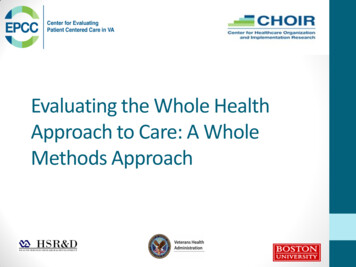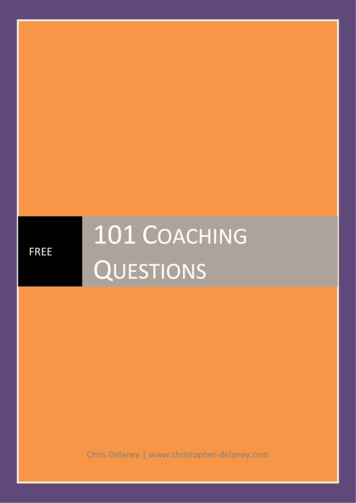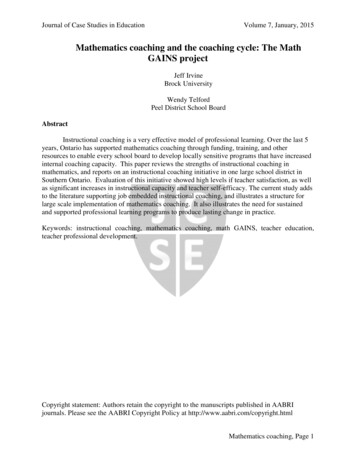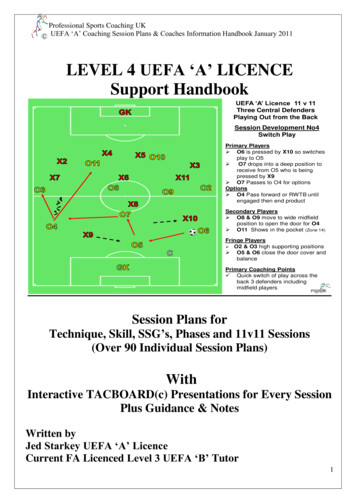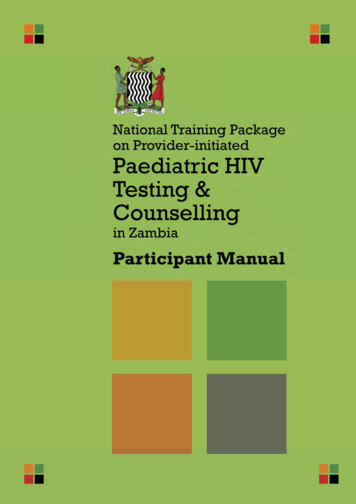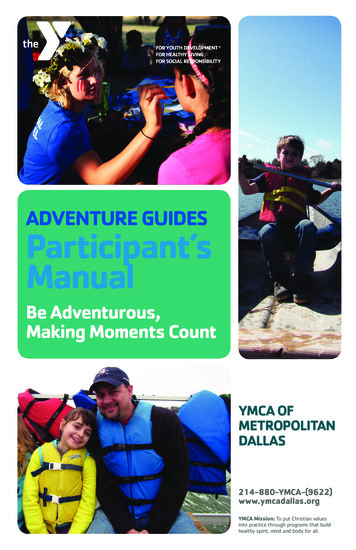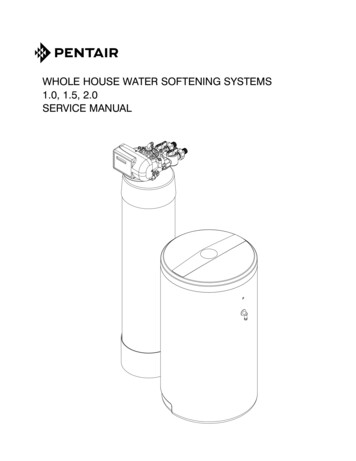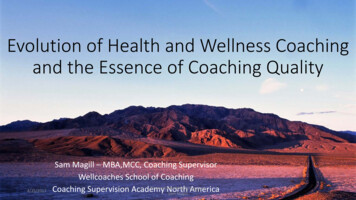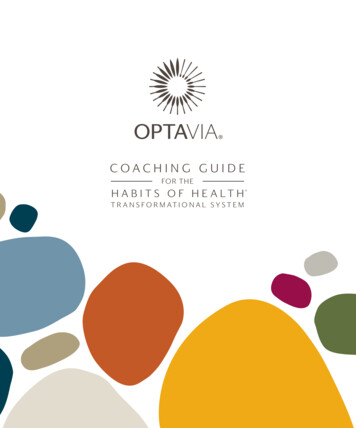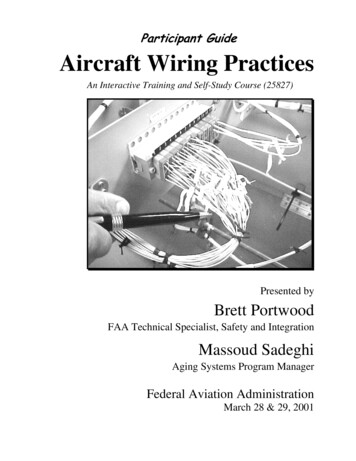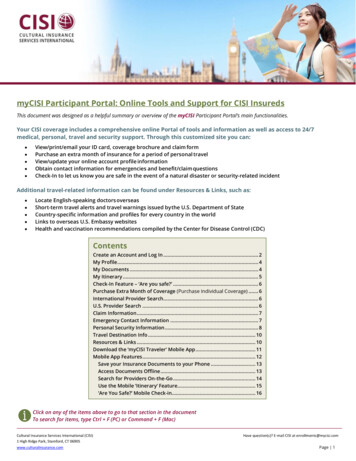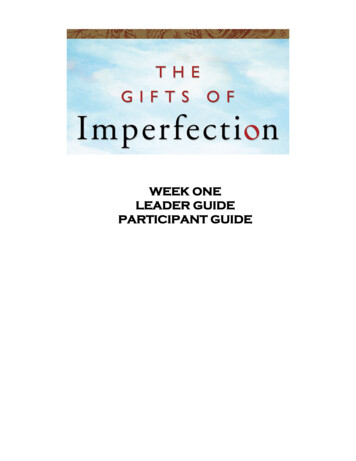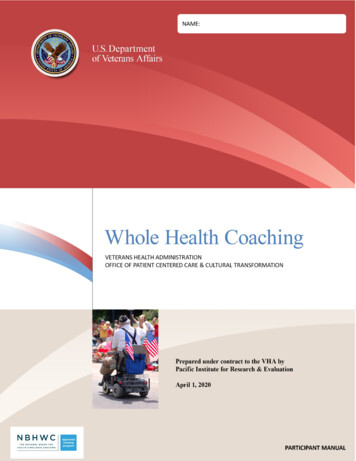
Transcription
NAMEWhole Health CoachingVETERANS HEALTH ADMINISTRATIONOFFICE OF PATIENT CENTERED CARE & CULTURAL TRANSFORMATIONPrepared under contract to the VHA byPacific Institute for Research & EvaluationApril 1, 2020PARTICIPANT MANUAL
WHOLE HEALTH COACHING PARTICIPANT MANUAL – FOUNDATIONSTABLE OF CONTENTSWELCOME . 1INTRODUCTION . 3WHY HEALTH COACH TRAINING? . 3PERSONALIZED . 3PROACTIVE . 4PATIENT-DRIVEN . 4HEALTH . 4PERSONAL HEALTH PLAN . 4FUTURE OF HEALTH COACHING IN THE VHA . 5HEALTH COACH CERTIFICATION . 5NBHWC CERTIFICATION EXAMINATION . 6TRANSITION PHASE ELIGIBILITY . 6NBHWC APPROVED PROGRAM ELIGIBILITY . 7CHAPTER 1: PRINCIPLES OF HEALTH COACHING . 9COACHES ARE NOT THE ONLY EXPERTS IN THE ROOM . 9THE AGENDA IS THE VETERAN’S . 9HEALTH COACHING IS PRIMARILY PRESENT AND FUTUREORIENTED . 9EMPHASIS IS ON HEALTH ENHANCEMENT, STRENGTHS, ANDASPIRATIONS . 10THREE HELPING STYLES . 10HEALTH COACHING UTILIZES A GUIDING STYLE, RATHER THAN ADIRECTING OR FOLLOWING STYLE . 10OTHER MODELS THAT SHARE PRINCIPLES IN COMMON WITHWHOLE HEALTH COACHING . 12SPECIFIC VHA HEALTH COACHING PRINCIPLES . 13COACHES SHOULD BE CULTURALLY SENSITIVE AS WELL ASCULTURALLY COMPETENT . 13COACHES WILL WORK WITH PACTS AND OTHER PROVIDERS TODELIVER TEAM CARE . 13VHA / Office of Patient Centered Care & Cultural TransformationApril 1, 2020 i
WHOLE HEALTH COACHING PARTICIPANT MANUAL – FOUNDATIONSCHAPTER 2: QUALITIES OF A WHOLE HEALTH COACH . 15THE DESIRED QUALITIES OF A WHOLE HEALTH COACH . 15A LISTENER . 15RESPECTFUL . 15BEING FULLY PRESENT . 15PRACTICE THE ATTITUDES OF MINDFULLNESS . 15A PARTNER . 16ARTICULATE AND SUCCINCT . 16WILLING TO LEARN AND BE OPEN . 17EMPATHIC . 17INTEREST IN HEALTH ENHANCEMENT AND EDUCATION . 17MINDFUL AWARENESS . 17BASIC INSTRUCTIONS FOR PRACTICING MINDFUL AWARENESS OFTHE BREATH . 18FORMAL PRACTICE . 19INFORMAL PRACTICE . 19CHAPTER 3: ACTIVE COMMUNICATION SKILLS FOR COACHING . 21LISTENING IS THE FOUNDATION FOR COMMUNCATION . 21THE PAUSE . 21SIMPLE AND COMPLEX REFLECTIONS . 21SIMPLE REFLECTIONS . 22COMPLEX REFLECTIONS . 22METAPHOR . 24ACKNOWLEDGMENT . 24ADDITIONAL COMPLEX REFLECTIONS . 25INQUIRY . 25DIRECT COMMUNICATION . 28CHAPTER 4: THE HEALTH COACHING PROCESS . 29HOW TO USE THE HCPM . 30STAGES AND PHASES OF THE HCPM . 31STAGE I, PHASE 1—CREATE A VISION . 32
WHOLE HEALTH COACHING PARTICIPANT MANUAL – FOUNDATIONSSTAGE I, PHASE 2—DISCOVERING VALUES AND VALUE CONFLICTS. 33STAGE II, PHASE 1—CONDUCT A SELF-ASSESSMENT . 34STAGE II, PHASE 2—SELECTING A FOCUS . 35STAGE II, PHASE 3—ASSESSING READINESS . 36STAGE III, PHASE 1—SETTING A GOAL . 36STAGE III, PHASE 2—ESTABLISHING ACTION STEPS . 38STAGE III, PHASE 3—IDENTIFYING AND EXPLORING POTENTIALBARRIERS . 39IDENTIFYING AND DEALING WITH INTERNAL BARRIERS . 40DEVELOPING PERSPECTIVES . 40WORKING WITH NEGATIVE SELF-TALK . 41WORKING WITH THE INNER CRITIC . 42WORKING WITH COMPETING OR CONFLICTING VALUES . 42ELICIT – PROVIDE - ELICIT . 43BRAINSTORMING . 44STAGE III, PHASE 4—ESTABLISH ACCOUNTABILITY . 44STAGE III, PHASE 5—PROVIDE AFFIRMATIONS . 45STAGE IV, PHASE 1—ASSESS THE ACTION TAKEN (OR NOT TAKEN)46STAGE IV, PHASE 2—LESSONS LEARNED . 46STAGE IV, PHASE 3—RE-PLAN FOR THE FOLLOWING WEEK, ORUNTIL THE NEXT SESSION . 46STAGE IV, PHASE 4—TAKE FURTHER ACTION . 47WHEN UTLIZING THE FULL COACHING PROCESS IS NOT FEASIBLE ORPOSSIBLE . 47CHAPTER 5: ENHANCING YOUR WHOLE HEALTH COACHING SKILLS . 51UTILIZING A PEER SUPPORT GROUP . 52SUGGESTIONS FOR CREATING A HEALTH COACHING ENHANCEMENTPROGRAM . 53ESTABLISHING A HEALTH COACHING SUPPORT NETWORK AT YOURLOCAL SITE . 53WHOLE HEALTH COACHING TRAINING PROGRAM IMPLEMENTATIONASSESSMENT . 54CHAPTER 6: GROUP COACHING . 57VHA / Office of Patient Centered Care & Cultural TransformationApril 1, 2020 iii
WHOLE HEALTH COACHING PARTICIPANT MANUAL – FOUNDATIONSOPPORTUNITIES WITH GROUP COACHING . 57VETERANS’ ADVANTAGES/OPPORTUNITIES . 57COACHES’ ADVANTAGES/OPPORTUNITIES . 57ORGANIZATIONAL ADVANTAGES/OPPORTUNITIES . 58DECISIONS TO BE MADE IN HOW TO SET UP AND CONDUCT THEGROUP . 59DEALING WITH DIFFICULT GROUP MEMBERS’ BEHAVIOR OR GROUPPROCESSES . 63SETTING UP THE INITIAL GROUP SESSION . 64ENDING THE GROUP EXPERIENCE—THE LAST SESSION . 65CHAPTER 7: THE ETHICS OF COACHING . 67FACTORS CONTRIBUTING TO CHOOSING ETHICAL ACTION . 67AREAS OF COACHING REQUIRING ETHICAL CONSIDERATION . 69SOURCES FOR THE INFORMATION IN THIS CHAPTER INCLUDE: . 72CHAPTER 8: PRE-SESSION, FIRST SESSION, AND LAST SESSIONCONSIDERATIONS . 73PRE-SESSION . 73FIRST SESSION . 74LAST SESSION . 74ADDITIONAL COURSE MATERIALS . 75FINDING RESOURCES . 75COMPONENTS OF PROACTIVE HEALTH AND WELL-BEING . 75COURSE VIDEOS . 75ADDITIONAL VIDEOS . 76RESOURCES AND REFERENCES . 77WHOLE HEALTH WEBSITE . 77COMMUNITY OF PRACTICE CALLS. 77OTHER VA RESOURCES . 78SUGGESTED WEBSITES . 79SUGGESTED READING MATERIALS . 79MINDFUL AWARENESS SCRIPTS . 79INCLUDE SET-UP COMMENTS SUCH AS . 80WHAT MINDFUL AWARENESS IS NOT . 80
WHOLE HEALTH COACHING PARTICIPANT MANUAL – FOUNDATIONSAWARENESS OF BREATH SCRIPT . 80PRACTICE OF MUSCLE AWARENESS SCRIPT . 81MINDFUL EATING SCRIPT . 82LOVING KINDNESS MEDITATION SCRIPT . 83MINDFUL WALKING INSTRUCTIONS . 85BODY SCAN MINDFUL AWARENESS PRACTICE SCRIPT . 85VHA / Office of Patient Centered Care & Cultural TransformationApril 1, 2020 v
WHOLE HEALTH COACHING PARTICIPANT MANUAL – FOUNDATIONSWELCOMEWelcome to the Whole Health Coaching Program, an Approved Health and Wellness CoachTraining and Education Program by the National Board for Health and Wellness Coaching(NBHWC).Veterans Health Administration (VHA) established the Office of Patient Centered Care andCultural Transformation (OPCC&CT) in 2011 to lead one of the most massive changes in thephilosophy and process for healthcare delivery ever undertaken by an organized healthcaresystem. The Undersecretary for Health describes the ideal system as one in which “patients are incontrol of their health care, and the system is designed around the needs of the patient.” Toaccomplish this requires a paradigm shift from problem-based disease care to Whole HealthCare, based on the whole person.VHA defines Whole Health as patient-centered care that affirms the importance of a partnershipbetween the clinician and patient. The focus is on the whole person while co-creating apersonalized, proactive, and patient-driven experience. This approach is informed by evidence,and makes use of all appropriate therapeutic approaches, healthcare professionals, anddisciplines to achieve optimal health and well-being.The health care team begins with the Veteran as an individual and what matters to the Veteran intheir life. The team utilizes information from the Personal Health Inventory, a tool that helpsVeterans explore their vision of living life fully, their values, and their priorities. A PersonalHealth Plan is created by drawing on the Personal Health Inventory and risk assessment tools,establishing shared patient and clinical goals, employing evidence-based traditional and nontraditional interventions and treatments, and leveraging support systems within and outside ofVHA. Core competencies in team-based inter-professional collaboration are critical.Additionally, new processes and new roles are needed, not only for the health care team but forthe Veteran. This includes building skills and connecting with support and resources forsustainable behavior and lifestyle change and improved health outcomes.Key components of this approach to health care include the following: Personal vision and mission for life and health. Personalized health planning. Integrative medicine and self-care skill building and knowledge acquisition. Lifestyle and behavior change strategies. Support to succeed with and from significant others, health care team members, and thecommunity.VHA / Office of Patient Centered Care & Cultural TransformationApril 1, 2020 1
WHOLE HEALTH COACHING PARTICIPANT MANUAL – FOUNDATIONSThe Whole Health Coaching Program is a six-day, intensive training in communication andcoaching skills divided into two, three-day, in-person sessions, with study and practice sessionsbetween the two sessions. Whole Health Coaching teaches industry best practices for integratedhealth coaching, strategies and methods. It is a professional training program that is tailored tothe Veteran population. Whole Health Coaching core competencies include understanding therole of the health coach, coaching in various settings (face-to-face, individual, groups,telecommunication venues, etc.), establishing trusting relationships and effectivecommunication, creating awareness, designing actions, planning, setting goals, managingprogress and accountability, document management, and interfacing with the clinical team.It is our sincere hope that your experience in this training not only enhances the skills and corecompetencies you already possess, but also provides you with a personalized experience that willenrich your life.
WHOLE HEALTH COACHING PARTICIPANT MANUAL – FOUNDATIONSINTRODUCTIONThis manual is designed to supplement the health coach training developed and delivered forVeterans Health Administration (VHA) employees, much like a textbook. It containsdescriptions of the key training concepts, skills and strategies that are offered in face-to-facetraining and references for additional information. It contains the same information as deliveredin the face-to-face training but is organized by topics and does not cover the material in the sameorder as presented in the training. It also provides additional information not presented in theface-to-face training.Throughout the manual, the term Veteran or coaching partner is used, usually as the recipient ofcoaching. In other venues, the term partner, client or patient might be used. The use of Veteran inthis manual is not intended to be inclusive of only Veterans, nor is it intended to exclude anyoneelse, such as Reservists, Active Duty, or family members. To be less cumbersome, the termVeteran or partner is used to address everyone receiving coaching. Similarly, the terms WholeHealth Coach, health coach, or coach are interchangeable and used throughout this document.All refer to those providing coaching to the Veterans.WHY HEALTH COACH TRAINING?Health Coaching is an important link to helping the VHA achieve their Strategic Goals andObjectives for 2013-2018. These Goals are to:1. Provide Veterans personalized, proactive, patient-driven health care (and support tosuccessfully implement their personal health plans).2. Incentivize measurable improvement in health outcomes.3. Align resources to deliver sustained value to Veterans.On further examination, it could be said that the second and third goals are really in support ofthe first goal. Given this, health coaching is being disseminated and trained within the VHA to“provide Veterans personalized, proactive, patient-driven health care.”Furthermore, when considering the definition of the above terms in Goal 1, it becomes clearerhow health coaching supports that goal. The definitions of these terms are:PERSONALIZEDA dynamic adaptation or customization of recommended education, prevention and treatmentthat is specifically relevant to the individual user, based on the user’s history, clinicalpresentation, lifestyle, behavior and preferences.Coaches assist the Veteran in developing a plan that is based on what matters most to theVeteran; the plan is based on the Veteran’s values, preferences and lifestyle.VHA / Office of Patient Centered Care & Cultural TransformationApril 1, 2020 3
WHOLE HEALTH COACHING PARTICIPANT MANUAL – FOUNDATIONSPROACTIVEActing in advance of a likely future situation, rather than just reacting; taking initiative to makethings happen rather than just adjusting to a situation or waiting for something to happen.Coaches assist the Veteran in taking action that is present and future oriented. They assist theVeteran in engaging in life/health enhancing endeavors that are not just reactive but proactive intaking responsibility for what the Veteran wants.PATIENT-DRIVENAn engagement between a patient and a health care system where the patient is the source ofcontrol such that their health care is based in their needs, values, and how the patient wants tolive.Coaches recognize the Veteran as the source of control for how they want to live, and in whatchanges they want to engage and when. Coaches partner with the Veterans to support them inachieving the Veteran’s goals, needs and behaviors that support their values.HEALTHA state of complete physical, mental, and social well-being, and not merely the absence ofdisease or infirmity. (World Health Organization)Coaches recognize that health is much broader than the absence of disease and that health isimpacted by many facets of a Veteran’s life, and that healing can exist despite the presence ofdisease. Coaches seek to support the Veteran in achieving optimal health, by the Veteran’sstandard that takes into account the mental, physical, and social well-being of the Veteran.PERSONAL HEALTH PLANA uniquely personalized plan for health that is built upon each patient’s values, conditions,needs and circumstances which uses the most appropriate interventions and strategies. Itaddresses the skills and support needed to help engaged patients manage their disease, in orderto regain and maintain optimal health and wellbeing and manage chronic disease and disabilityto the greatest extent possible.Coaches assist the Veteran in planning for their health, not simply reacting to the most currenthealth concern. Again, the Personal Health Plan is designed by the Veteran with the support ofthe Coaches.
WHOLE HEALTH COACHING PARTICIPANT MANUAL – FOUNDATIONSFUTURE OF HEALTH COACHING IN THE VHAThe Office of Patient Centered Care & Cultural Transformation (OPCC&CT) recognizes thatWhole Health Coaching (WHC) builds on existing coach training in the Department of VeteransAffairs (VA) and continues to evolve to be fully integrated with the other programs. Since itsinitial course offering in 2013, WHC has become a significant component of the Whole HealthSystem – it is a core service of both the Pathway and Well-being Programs and a growingcomponent of Clinical Care. A nationally classified Position Description was developed andadopted in 2015. At the start of 2020, nearly 2,300 VA Whole Health Coaches work withVeterans nationwide to help them set goals based on their health priorities and personal healthplans. Coaches also offer support, encouragement and attention to help Veterans stay on track tomeet their health and well-being goals.VA has achieved a milestone in health care tracking advancing the future of health coaching as atreatment. In 2019, VA successfully applied to the American Medical Association (AMA) tocreate new Category III Current Procedural Terminology (CPT ) tracking codes for Health andWell-being Coaching. To accomplish this, VA teamed with the National Board for Health andWellness Coaching (NBHWC), the non-profit organization that created the national standards forhealth Coaches. VA anticipates use of the codes will increase recognition of Health Coaching asa valuable service, make its usage more common throughout health care and support its benefitas a service in the future.HEALTH COACH CERTIFICATIONUp until recently, health coach certification was not nationally recognized. Through the efforts ofthe National Board for Health & Wellness Coaching (NBHWC), formerly InternationalConsortium for Health and Wellness Coaching (ICHWC), a national certification process is nowin place. In 2016, the VHA was approved as a Transitionally Accredited Health CoachingProgram by NBHWC. To meet this requirement, Practical Skills Evaluations (PSA) have beenadded to the mentoring process. All course participants who meet the transitional programrequirements of attending all sessions of the training and participating in all three betweensession triad practices, and who receive a Certificate of Completion following the course areeligible to apply for the national exam.The Whole Health Coaching (WHC) program expanded its curriculum to adhere to nationalcredentialing standards, established by NBHWC. In addition to the existing 2-week Foundationscourse, OPCC&CT is offering a 3rd in-person Certification week. Participants registering forthe WHC Certification course must have completed the Foundations course to be eligible.The Certification course was piloted in FY20.In March 2020, OPCC&CT applied to NBHWC for permanent phase program approval.Following an online interview and review process, OPCC&CT received notice in April 2020 thatVHA / Office of Patient Centered Care & Cultural TransformationApril 1, 2020 5
WHOLE HEALTH COACHING PARTICIPANT MANUAL – FOUNDATIONSthe VHA Whole Health Coaching Program was approved by NBHWC for the education andtraining of health and wellness coaches.As an overview of WHC programs offered in FY20, the 2-week Foundations program willcontinue to offer a comprehensive curriculum of essential coaching skills and strategies that VAemployees may apply to their respective job roles. In addition to its existing content, theFoundations program is being enhanced in FY20 to include: Experiential practices for barriers often encountered by Veterans.Enhanced instruction around group coaching.More time for personalized faculty mentor feedback.The Certification in-person week will build on advanced skills and introduce session structurerelevant to dedicated Whole Health Coaches. In-person curriculum highlights include: Coaching Session Structure (coaching agreements, how to conduct an initial session,routine ongoing sessions, closing sessions).How to use Mindful Awareness to help support coaching presence and the coachingrelationship.Advanced coaching skills and strategies (including interrupt/redirect, perspectives,coaching around stages of change).Coaching ethics.Group coaching tips & techniques, including handling challenging group dynamics.NBHWC CERTIFICATION EXAMINATIONTo earn the National Board Certification, health and wellness coaches must meet the eligibilityrequirements summarized below for each phase, and then pass the National Board CertificationExamination. The examination is based upon the NBHWC Job Task Analysis/Content Outline.The written examination will be administered throughout the United States and in severalinternational locations.TRANSITION PHASE ELIGIBILITYTo earn the National Board Certification during the Transition Phase, the following requirementsmust be met. A list of Approved Transition Programs is available at NBHWC.org.If you have completed an Approved Transition Program, to earn the NBHWC National BoardCertification you will need to provide: Documentation of an Associate degree or higher in any field. You will need to upload acopy of your highest degree transcripts or certificates. For those who do not have anAssociate degree, exam candidates will need to provide documentation of 4,000 hours ofwork experience in any field.
WHOLE HEALTH COACHING PARTICIPANT MANUAL – FOUNDATIONS A certificate of completion from an Approved Transition Program. A written log of 50 health and wellness coaching sessions* of at least 20 minutes induration, and of which at least 75% of each session is devoted to coaching facilitation andnot education. They may not be sessions with friends, family or classmates. They can beeither paid or pro bono. Coaching log to include coded identity, date and time, sessionnumber (e.g. 1, 2, 3 etc.) and coaching topics. Please download and complete the log atNBHWC Coaching Log. * The coaching session log cannot include sessions thatoccurred prior to the course completion and receipt of the WHC Certificate ofCompletion. Demographic information (e.g. education, work experience) for NBHWC researchpurposesNote: You are responsible to acquire the healthy lifestyle knowledge summarized in theNBHWC Content Outline, available at NBHWC.org. Transitionally approved programs may ormay not be teaching this content, therefore individuals must attend to that content themselves.Permanent phase accreditation of programs will require this content be taught.If you have attended an NBHWC-Approved Transition Program, you must sit for the exam byFebruary of 2021. The last date to apply for this exam is October 30, 2020. You may also chooseto sit for an exam prior to this. If you do not apply for and sit for the exam by February 2021,you will be required to complete the full three-week WHC approved program.Additional requirements for credentialing can be found online at the NBHWC website:https://nbhwc.org/NBHWC APPROVED PROGRAM ELIGIBILITYFollowing the October 2020 application deadline and February 2021 exam date, anyone wishingto pursue NBCHWC certification will need to complete all components of the Whole HealthCoaching Program. Currently, the requirements are the same as those listed in the TransitionPhase Eligibility section, but they are subject to change. It is important to check the NBHWCwebsite frequently to stay current on all requirements.VHA / Office of Patient Centered Care & Cultural TransformationApril 1, 2020 7
WHOLE HEALTH COACHING PARTICIPANT MANUAL – FOUNDATIONS
WHOLE HEALTH COACHING PARTICIPANT MANUAL – FOUNDATIONSCHAPTER 1: PRINCIPLES OF HEALTH COACHINGThis chapter is devoted to the health coaching principles that have been deemed significant forVHA staff to possess in moving forward with health coach training. This is not necessarily acomplete list, as other programs may include additional ideologies; however, these provide asolid foundation.COACHES ARE NOT THE ONLY EXPERTS IN THE ROOMCoaches are trained to elicit the “expertise” from the Veterans. This principle assumes that theVeteran is the best person to decide what is in their best interest, both in terms of the agenda forthe coaching sessions as well as the timing and strategies of getting to the Veteran’s goals andactions. The Veteran may decide that they need further information or education, and the coachcan assist the Veteran in getting the information they need. The coach’s expertise lies in guidingthe change process. In addition, coaches may have expertise in a given content area. In the wholehealth coaching training offered by the VHA, coaches will be provided a format for sharing theirexpertise, if appropriate. This process is called, “Elicit, Provide, Elicit.”THE AGENDA IS THE VETERAN’SCoaches operate on the principle that the agenda for the training sessions comes from theVeteran. Although this has been stated above, it warrants a separate principle. Coaches may havemany opinions about what the Veteran should identify as the agenda for coaching. Coaches mayhave opinions about where, when and how much effort the Veteran should be expending in acertain content area. However, this is not up to the coaches to decide. There may be pressurefrom the medical team or other providers as to what should be the focus of the Veteran’scoaching sessions. Coaches need to artfully address these pressures. In the end, it is the Veteranwho will decide the agenda and course of action, or resistance will be encountered and the effortto “change” the Veteran will be thwarted.HEALTH
Whole Health Coaching. VETERANS HEALTH ADMINISTRATION OFFICE OF PATIENT CENTERED CARE & CULTURAL TRANSFORMATION. Prepared under contract to the VHA by Pacific Institute for Research & Eval
